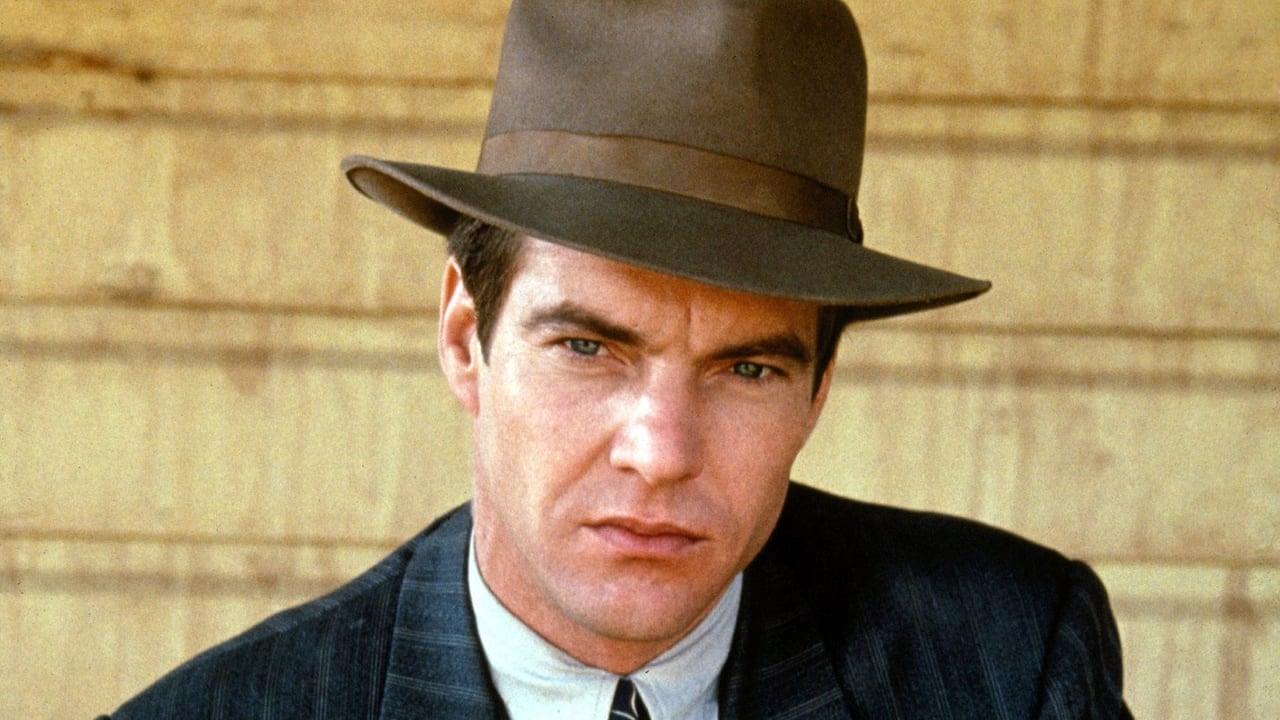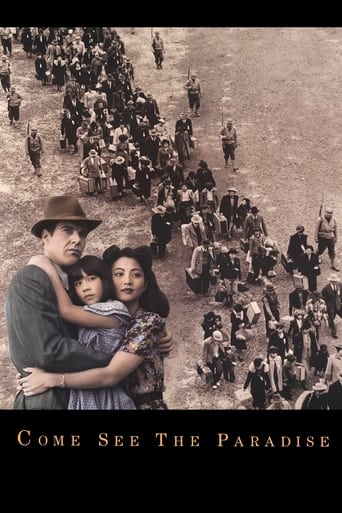



Wonderful character development!
Instead, you get a movie that's enjoyable enough, but leaves you feeling like it could have been much, much more.
View MoreAll of these films share one commonality, that being a kind of emotional center that humanizes a cast of monsters.
View MoreIt's simply great fun, a winsome film and an occasionally over-the-top luxury fantasy that never flags.
View MoreCome See The Paradise is an insult to the experiences that Japanese Americans and millions of other interned people have experienced. The film depicts the unconstitutional internment of Japanese American citizens and immigrants during World War II, but only does so through the story of an interracial couple. While the film could have addressed the social conflicts that an interracial couple would have faced at the time (and too often still face today), it falls short of truly depicting the American hatred for Japanese immigrants during World War II. The film spends entirely too long on the relationship between Jack (Dennis Quaid) and Lily (Tomita Tomlyn), and far too little time on the ways in which internment affected Japanese people living in America during and after internment. Although this movie is not anything close to what it could have been, there is a certain amount of credit that should be given to the producers and directors for portraying the lives and struggle of Japanese-American citizens and immigrants in their most dire times. It is important to be able to represent and confront the atrocities that America has committed in the name of freedom, but this is not an entirely accurate representation. The film shows only a limited amount of struggle that the Japanese citizens underwent leading up to their internment. It seems that many of them are extremely willing to go away to these camps, selling their belongings and even refusing offers that are deemed too low for certain items. There is only a brief instance of despair before the family leaves for the camp when Lily tells the family to smash the record players. When they leave the platform and say goodbye to Jack, they seem hopeful that they would be seeing him extremely soon. Although this movie is not perfect by any stretch of the imagination, it does address a few meaningful aspects of camp life. The depiction of Mr. Kawamura's decline is quite representative of the way in which the camps and the country stripped away any sense of belonging and pride from the Japanese citizens and immigrants. Mr. Kawamura shows what the camp did to many and that there was little to live for once interned. Additionally, Charlie's rebellion against the American government demonstrates the struggles that many faced in their situation. Many faced the difficult choice of turning their backs on a country and a life that was all they knew, but were forced to do so because of the injustices that the American government was doing to them and their families. Finally, the scene in which Lily exclaims to a guard that the camp was nothing but an outdoor prison was particularly meaningful because it contradicts the American propaganda that the camp was a place that the Japanese citizens "wanted" to be. Although there are a few powerful scenes and narratives that are sprinkled throughout the movie, overall, it fails to be an accurate depiction of internment.
View MoreA very well acted and directed movie. Excellent details to the period with great cinematography. The story line is interesting with a very important subject matter. Most Americans nowadays have no idea that our government imprisoned these Japanese-Americans against their Constitutional rights. That alone is enough for the movie to be made and seen. We Americans tend to be forgetful of our past and neglect of history lessons from our own history. We have such track records of bias and discrimination against Asian immigrants such as the Chinese, the Japanese, the Vietnamese, the Cambodian, etc. Not to mention the two biggest stains on our social fabric: the African slaves and their descendants; and the Native Americans and their descendants. Remember, we build this nation from stolen land of the American-Indians and on the backs of the slaves. Along the way, we despised and badly treated every new group of immigrants come to this country with our discriminatory legislation and laws, overtly or covertly, with the government help or without. We need to know our history and learn from our mistakes to make a better nation... but then come Bush, Jr. ... and now... Donald Trump! We know we did not learn anything as a nation.
View MoreGood, but could have been great. Details one of the shadier acts in US history - the internment of Japanese-Americans in camps during World War 2. Quite moving. You share in the injustice of the situation.However, pacing is uneven. Spends much time building up this event (not overly so, though) but then speeds up towards the end, skipping some details and diluting the effect. A more powerful movie would have concentrated more on the internment camps. A bit too schmaltzy too.Good performances all round.
View MoreWell, I recently experienced "Come See the Paradise" with Dennis Quad. The movie tells the often overlooked and not widely known story of Japanese Americans before, during and after WWII. This film was incredible to say the least, the characters very well drawn up and telling a simple love story beautifully. The performances are memorable and one can feel the sense of conflict in these characters. At times I was actually nearly brought to tears, a rare thing for me (the only movies that have ever made me cry are "Godzilla vs. Destroyah", "I am Legend", "Pokémon 2000" ,I was like seven, "Rodan" and "Schindler's List"). The encampment of Japanese-Americans is often overshadowed by Pearl Harbor and the Holocaust, but this film shows it how it really happened. The struggle of loyalty, patriotism and freedom all are called out in this movie quite nicely, the director just telling it how it is, you know? The story is sad one that finally lives up to its title, although I couldn't really enjoy it the first time around with my history teacher treating us like five year olds! I only wish it had a scene of the Atomic bomb being dropped on Nagasaki or Hiroshima. It would of helped audiences understand the atrocity of using such a weapon on defenseless civilians.
View More